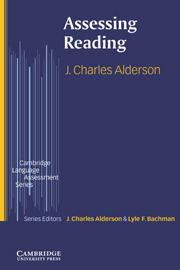Book contents
- Frontmatter
- Contents
- Series Editor's Preface
- Acknowledgements
- Abbreviations
- 1 The nature of reading
- 2 Variables that affect the nature of reading
- 3 Research into the assessment of reading
- 4 The reader: defining the construct of reading ability
- 5 A framework for test design
- 6 Tests in the real world: test purposes
- 7 Techniques for testing reading
- 8 The development of reading ability
- 9 The way forward. Assessing the interation between reader and text: processes and strategies
- Bibliography
- Index
2 - Variables that affect the nature of reading
Published online by Cambridge University Press: 03 May 2010
- Frontmatter
- Contents
- Series Editor's Preface
- Acknowledgements
- Abbreviations
- 1 The nature of reading
- 2 Variables that affect the nature of reading
- 3 Research into the assessment of reading
- 4 The reader: defining the construct of reading ability
- 5 A framework for test design
- 6 Tests in the real world: test purposes
- 7 Techniques for testing reading
- 8 The development of reading ability
- 9 The way forward. Assessing the interation between reader and text: processes and strategies
- Bibliography
- Index
Summary
Introduction
As explained in Chapter 1, the amount of empirical research into reading in the mother tongue is simply enormous and, although it is much smaller in quantity and scope, there is also a growing research literature on reading in a second or foreign language. But anybody who wishes to assess reading must have at least some idea of what reading is, and therefore of what the main findings of research are. The aim of this chapter is not to present an extensive, much less exhaustive, review of the literature, but rather to acquaint the reader with the main thrusts of research findings in so far as they are relevant to the design of tests or assessment procedures for reading. The interested reader will find an extensive bibliography for further reference at the end of the book.
It has become common practice to divide research into factors that affect reading into the two main constellations of variables that are typically investigated. This chapter follows that convention by presenting first the research that has looked at factors within the reader: aspects of the person doing the reading that have been thought or shown to have an effect on the reading process and the product of reading. The second major section will look at those aspects of the text to be read that are of significance.
Inevitably this division leads to a degree of distortion, both of the research in some cases, and of our overview of reading.
- Type
- Chapter
- Information
- Assessing Reading , pp. 32 - 84Publisher: Cambridge University PressPrint publication year: 2000



